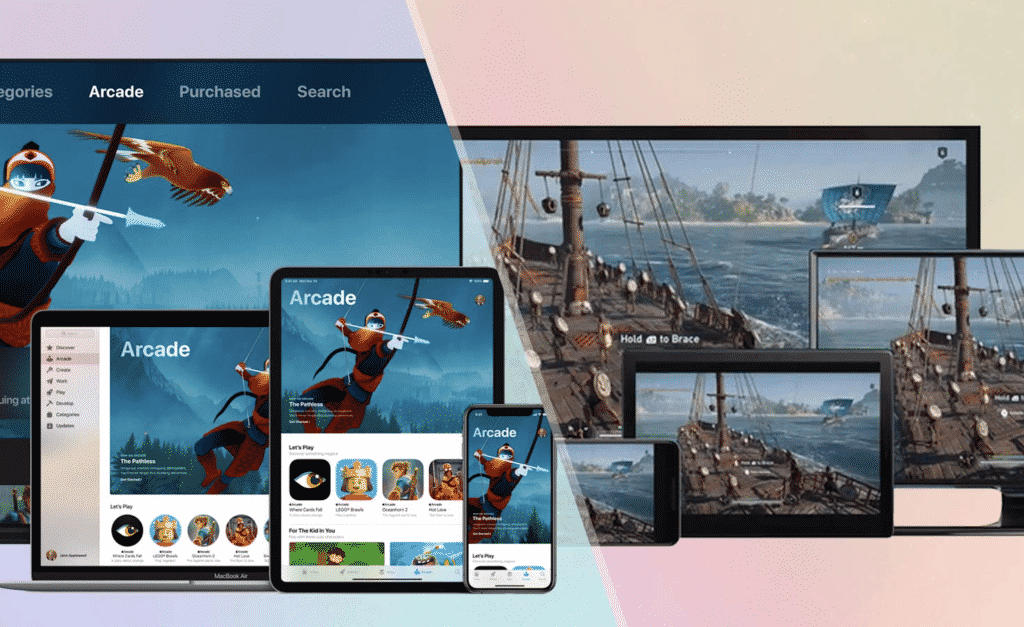If we didn’t know better, we’d say that Apple has decided that it’s going to close out 2020 by taking on every tech and gaming company that it can find. Technology websites and newspapers have been full of reports about the company’s ongoing dispute with Epic Games, the makers of “Fortnite,” for the past few months. That dispute still isn’t over, and the latest season of “Fortnite” still isn’t available to players who use Apple-built devices to access the game. It’s a fight that’s already gone to court and might still get ugly for both companies, but apparently, that isn’t enough for Apple. The company has now decided that it’s going to take on fellow tech giant Google as well.
For the past twelve months, Google has been trying to get its “Stadia” video gaming platform off the ground. For those who haven’t come across it yet, the easiest way to describe Stadia is as a sort of video gaming equivalent of an online slots website. As is the case with the more popular online slots like Wold Gold slot, Stadia allows gamers to interact with games through any device that has a screen and an internet connection and can receive input through a controller. It breaks the link between top-end video games and video game consoles in the same way that online slots websites broke the link between casino games and casinos when they started to become popular ten years ago. In Google’s eyes, Stadia is the product that will launch the “streaming era” of video games, and that makes it worth persisting with even if initial takeup hasn’t been quite what they’d hoped for.
In its first few months, Stadia struggled. Internet connection speeds meant that lag was an issue in many parts of the world. Some devices didn’t work with Stadia, whereas others could load the app or the web portal but couldn’t be paired up with a controller. Hardcore gamers complained that the range of games wasn’t as strong as they’d been led to believe that it might be, and the monthly subscription price wasn’t good value for money. Google listened to all of that feedback and began to make changes. Just about any standard video game controller can now be made to work with Stadia. System stability has improved dramatically, and the range of games has increased exponentially. You’re no longer required to purchase hardware directly from Google to engage with Stadia, and if you’d like to ‘try before you buy,’ there’s a free tier available. From what looked like a ‘dead on arrival’ product, Google’s baby now has media outlets as reputable as the Financial Times asking whether it will eventually kill off consoles as a concept. It’s been a remarkable turnaround to watch, and might be the reason that Amazon has decided to wade into the gaming market with a near-identical platform called “Luna.”

Apple has been watching all of these developments with interest and has seemingly decided that now is the right time to get involved and throw a spanner in Google’s works. Stadia has never been available through iOS because of Apple’s notoriously restrictive rules about apps, but until recently, it’s been possible to circumvent that soft ban by using an app called “Stadium.” Once downloaded, the app allowed iOS-device users to gain access to Stadia through a web browser. This is nominally permissible according to Apple’s rules on the matter, which say that developers are allowed to use web browser apps to reach users who don’t have access to Apple’s own app store. In this one specific instance, though, they’ve decided those rules don’t apply. They say that the part of the app that allowed users to connect Bluetooth controllers to Stadia was a violation of their store policy, and the app will be removed because of it.
At this stage, we should note that Apple has a good reason to push Google Stadia – and any service like it – out of its App Store. Apple has its own video game streaming platform available in the shape of Apple Arcade, and Apple Arcade hasn’t performed as well as Apple hoped that it would during its first year. The powers-that-be at Apple have been working hard recently to turn around the platform’s performance with new games and a new direction, but there’s an obvious incentive for Apple to promote its own platform at the expense of all others. Excluding other game streaming platforms from its stores would be the most obvious and effective way to go about this task. Apple has always insisted that it doesn’t do that, and that any exclusions from the App Store are down to policy violations and nothing else, but at least one of their former senior employees says otherwise.
Recently, Phil Shoemaker has been speaking to politicians in the United States of America. More specifically, he’s been speaking to a House antitrust committee who are investigating Apple’s conduct when it comes to how their App Store is run. Shoemaker’s testimony is important because, in the past, he was the director of Apple’s App Store. According to him, Apple finds reasons to exclude apps made by other developers while simultaneously pushing Apple Arcade despite the fact that Apple Arcade is guilty of the same theoretical violations of App Store policies as its rival platforms. To put that another way, Apple stringently applies the rules to apps that it doesn’t want in its store but doesn’t apply those same rules to its own apps. It’s a damning allegation and one that Apple strenuously denies, but it’s been made by someone who has direct first-hand experience of the company’s vision.
Google has not yet commented on the ban on the Stadium app and may not do so as it wasn’t a Google creation. The company also has its own problems with Epic Games, as Epic has also accused Google of operating an effective monopoly through its “Play Store” on Android phones. Because of that, it’s unlikely that Google will throw its considerable support behind Epic Games as it looks to force Apple to relax its App Store rules. Should those rules be relaxed, Google and its Stadia platform might be one of the primary beneficiaries in the video gaming world. That would be a classic case of ‘the enemy of my enemy is my friend.’
